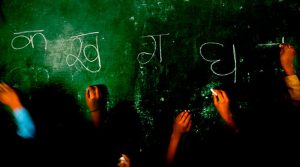
04-08-2017 (Important News Clippings)
To Download Click Here.
Wrong move
Scrapping no-detention policy won’t improve learning outcomes in schools
TOI Editorials

Bringing back year-end examinations for Classes V and VIII and detaining students who fail them won’t improve learning outcomes. It will simply palm off the responsibility of learning to students, letting teachers off the hook. Students from economically well off backgrounds can overcome the pass-fail system through out-of-school tuitions. But this option simply isn’t available to economically disadvantaged students who are clinging to the school system precariously. Hence, a reversal of the no-detention policy in the foundational years of schooling is bound to increase dropouts, casting a shadow on the future of millions of disadvantaged students.
It needs to be recalled that an important aspect of RTE was continuous comprehensive evaluation where teachers were to periodically assess students’ progress without a pass-fail exam. However, this was never implemented properly. In fact, an analysis of RTE over the last two years shows that more emphasis was laid on implementing 25% free seats for economically weaker children in private schools than on upgrading infrastructure or teacher training. This clearly shows that improvement of quality of education continues to get short shrift. Politicians still see education as a tool to disburse patronage rather than a means to uplift the next generation.It’s precisely this approach that’s behind the caste-based reservation policy, both in higher education and government jobs. But as experience shows, quotas simply initiate a race to the bottom with each community fighting to get a share of the reservation pie. This in turn creates a creamy layer within the disadvantaged communities, perpetuating the cycle of inequality. The real solution to socio-economic deprivation lies in improving quality of and access to education. And that requires making teachers do their job better as well as fixing shortcomings in educational infrastructure and administration. Governments must deliver inclusive education policies that nurture students and keep them in school.
Mid-term assessment of the Niti Aayog
ET Editorials
Has the Niti Aayog proved a worthy successor to the Planning Commission? The question is a natural corollary to the surprise departure of its first boss midway through his tenure.The answer is not straightforward. It is difficult to claim that the Aayog has emerged as the go-to institution for solving economic problems that the Centre and the states confront.Not that the Aayog has been lax about initiating proposals and schemes. Some of its policy recommendations on energy and regulation of healthcare do make a lot of sense, but these have not found traction with the arms of the government charged with formulating and implementing policy.
Unless a policy recommendation carries the explicit imprimatur of the Prime Minister, it is not taken with the seriousness its intrinsic merit might warrant — this is the hard reality. But this does not mean that the Aayog has failed. Where the Aayog has found a unique role for itself is in monitoring outcomes in some key areas such as health, education and water management.
The Aayog holds regular meetings with chief secretaries of states and with secretaries of the concerned departments, to monitor progress on outcome milestones.States that are found wanting risk losing funds for new projects in that sector while states that show eager progress are assured greater funds. Since the days of formula-linked Plan assistance are history, money from central ministries would flow to those states that demonstrate the will and the ability to implement schemes.This leads to healthy competition among states. The Niti Aayog, through its regular monitoring of projects in key areas, becomes a platform for articulating what some would call competitive federalism, besides for the monitoring of key projects.In this, it shares a key feature of the erstwhile Planning Commission: the exercise of central authority that is not part of the constitutional scheme of things. Its remedy lies in the policy, with the states discharging their assigned functions with their resources, including statutory transfers from the Centre.
ऊर्जा सुरक्षा पर ध्यान से भारत होगा बलवान
अरुणाभ घोष, (लेखक ऊर्जा, पर्यावरण एवं जल परिषद (सीईईडब्ल्यू) के मुख्य कार्याधिकारी और ऊर्जा के राजनीतिक अर्थशास्त्र पर केंद्रित द पालग्रेव हैंडबुक के सह-संपादक हैं)
भारत ऊर्जा के क्षेत्र में एक बड़ी ताकत बनकर उभर सकता है लेकिन इसके लिए विशेष प्रयासों की जरूरत होगी। इस संबंध में विस्तार से जानकारी दे रहे हैं अरुणाभ घोष

राज्यसभा में सुधार का सही समय
डॉ. एके वर्मा, [ लेखक सेंटर फॉर द स्टडी ऑफ सोसाइटी एंड पॉलिटिक्स के निदेशक एवं राजनीतिक विश्लेषक हैं ]
राष्ट्रपति और उप-राष्ट्रपति चुनाव, राष्ट्रीय-पिछड़ा वर्ग संशोधन विधेयक पर सरकार की लज्जाजनक हार और सदस्यों की गैरहाजिरी को लेकर संसद का उच्च सदन राज्यसभा अचानक कुछ ज्यादा ही सुर्खियों में आ गया है। नरेंद्र मोदी सरकार के लोकसभा चुनाव 2014 में प्रचंड बहुमत प्राप्त करने के बाद से राज्यसभा बराबर लोकसभा से टकराव का रास्ता अपनाए हुए है। राज्यसभा को कानून बनाने और संविधान संशोधन करने के संबंध में लोकसभा के बराबर अधिकार है, लेकिन अभी भाजपा को राज्यसभा में बहुमत हासिल नहीं है। हालांकि संविधान के अनुच्छेद 108 के अनुसार दोनों सदनों में किसी कानून को पारित करने पर विवाद की स्थिति में राष्ट्रपति उनका एक संयुक्त अधिवेशन बुला सकता है। केवल धन-विधेयक पर राज्यसभा को कोई अधिकार नहीं। इसीलिए मोदी सरकार ने आधार-विधेयक को धन-विधेयक के रूप में पेश किया जिससे उसे राज्यसभा के व्यवधान से बचाया जा सके, परंतु प्रत्येक विधेयक के मामले में ऐसा करना संभव नहीं है। तो क्या राज्यसभा द्वारा विरोध और व्यवस्थापन में व्यवधान के चलते प्रचंड जनादेश प्राप्त किसी सरकार को काम करने से रोका जा सकता है? मोदी सरकार ने संविधान के अनुच्छेद 338 और 338(अ) के अंतर्गत ‘राष्ट्रीय अनुसूचित जाति आयोग’ और ‘राष्ट्रीय अनुसूचित जनजाति आयोग’ की तर्ज पर एक ‘राष्ट्रीय-पिछड़ा वर्ग आयोग’ बनाने के लिए संविधान संशोधन विधेयक पेश किया था। संविधान के अनुच्छेद 340 में राष्ट्रपति को एक पिछड़ा वर्ग आयोग बनाने का अधिकार है, पर उस आयोग का स्तर अनुसूचित-जाति और अनुसूचित जनजाति राष्ट्रीय आयोग जैसा नहीं है। शायद बहुतों को पता भी नहीं कि अनेक जनजातियां गलती से पिछड़े-वर्ग में सम्मिलित कर ली गई हैं और बहुत सी जातियां पिछड़े वर्ग में प्रवेश के लिए तरस रहीं हैं। इसलिए राष्ट्रीय पिछड़ा वर्ग आयोग बहुत महत्वपूर्ण विधेयक है, लेकिन कांग्रेस के दिग्विजय सिंह ने राज्यसभा में संख्या बल के आधार पर ऐसा संशोधन करवा लिया जिससे पिछड़ा वर्ग आयोग इस स्वरूप में मूर्त रूप ही न ले सके। क्या कांग्रेस को डर था कि संशोधन विधेयक पास होने से भाजपा को उसका राजनीतिक लाभ मिलेगा? शायद कांग्रेस यह भूल गई कि उसका यह दांव उल्टा भी पड़ सकता है और पिछड़ों में आधार बढ़ाने की दौड़ में वह और पिछड़ सकती है।
सरकार को अब वही कवायद दोबारा करनी पड़ेगी। लोकसभा में उस संशोधन विधेयक को दोबारा प्रस्तुत करना पड़ेगा और फिर उसे दोबारा राज्य सभा में भेजना पड़ेगा। राज्यसभा को यह नहीं भूलना चाहिए कि वह जनता द्वारा निर्वाचित सदन नहीं है और उसे लोकसभा से टकराव का रास्ता नहीं अपनाना चाहिए। इससे न केवल वह अपने मूल दायित्व से विमुख हो रही है, वरन जनता का भी कोप-भाजन बन सकती है। संविधान बनाते समय राज्यसभा को उच्च सदन की गरिमापूर्ण स्थिति दी गई और उम्मीद की गई थी कि दलगत राजनीति से ऊपर उठ कर वह स्तरीय बहस के आधार पर विधेयकों में सुधार और राज्यों के संघीय हितों का संरक्षण करेगी, न कि पिछड़ा वर्ग विधेयक जैसे प्रगतिशील विधेयकों को नष्ट करने का काम करेगी। यदि राज्यसभा कामकाज में रुकावट बनती है तो वह स्वयं अपनी गरिमा पर प्रहार करेगी। राज्यसभा में प्रतिपक्ष के नेता गुलाम नबी आजाद ने ठीक ही कहा कि ‘किसी को भी सदन को कमजोर करने का प्रयास नहीं करना चाहिए’, लेकिन ऐसा लगता है कि स्वयं उनकी अपनी ही कांग्रेस पार्टी ऐसा कर रही है। राज्यसभा सदस्यों को यह भी नहीं भूलना चाहिए कि सदन जनता के टैक्स से चलता है और सदन के सजीव प्रसारण से जनता को उन्हें अच्छी तरह से देखने-जांचने का मौका मिलता है। राज्यसभा में सदस्यों के व्यवहार से न केवल सदन के प्रति जनमत बनता है वरन राजनीतिक दलों का भी जन-मूल्यांकन होता रहता है जिसका दूरगामी प्रभाव दूसरे सदन लोकसभा के चुनावों पर भी पड़ता है।
हमारे संविधान बनाने वाले 299 विद्वानों ने ब्रिटिश संसदीय व्यवस्था का अनुसरण किया, लेकिन राज्यसभा का स्तर वहां की समकक्ष लॉर्ड-सभा (हाउस ऑफ लॉड्र्स) जैसा नहीं रखा। लॉर्ड-सभा को न तो कोई कानून बनाने का अधिकार है, न ही संविधान में संशोधन का। लॉर्ड-सभा में केवल वाद-विवाद होते हैं। यदि वहां की कॉमन-सभा (हाउस ऑफ कॉमंस जो हमारी लोकसभा का समकक्ष है) और सरकार उन वाद-विवादों से लाभान्वित होना चाहे तो और बात है। ब्रिटेन की लॉर्ड सभा कभी भी लोक सदन के लिए व्यवधान नहीं बन सकती और यह व्यवस्था आज से नहीं, वरन वर्ष 1910 से लागू है। इस संबंध में अटल बिहारी वाजपेयी द्वारा गठित न्यायमूर्ति एमएन वेंकटचलैया संविधान समीक्षा समिति की मार्च 2002 में की गई सिफारिशें याद आती हैं। राज्यसभा के संबंध में समिति ने खास तौर से सिफारिश की थी कि सदन का अधिवेशन कम से कम 100 दिन अवश्य चले और सदस्य अपने आचरण और व्यवहार से संसद की प्रतिष्ठा और गरिमा को बनाने की कोशिश करें।
समिति ने नए सदस्यों के गंभीर प्रशिक्षण की भी सिफारिश की थी जिससे वे संसद की जटिल प्रक्रियाओं, व्यवस्थाओं, नियमों, परंपराओं और संसदीय मर्यादाओं से रूबरू हो सकें, लेकिन राज्यसभा में गैरहाजिरी और विविध विषयों पर वाद-विवाद में सदस्यों की घटती रुचि के चलते एक नई समस्या पैदा हो गई है। राज्यसभा में 12 सदस्यों को साहित्य, विज्ञान, कला, और सामाजिक सेवा के क्षेत्र में विशेष ज्ञान या व्यावहारिक अनुभव के आधार पर मनोनीत किए जाने का प्रावधान है, लेकिन मनोनीत सदस्य तो जैसे भूले-भटके ही कभी राज्यसभा पहुंचते हैं। जैसा कि राज्यसभा सदस्य नरेश अग्रवाल ने मांग की कि रेखा और सचिन जैसे मनोनीत सदस्य या तो सदन में आएं या त्यागपत्र दें। मनोनीत सदस्यों को रखने के पीछे तर्क यह था कि ऐसे लोग चुनाव आदि के बारे में कभी नहीं सोच सकते, इसलिये उनके ज्ञान और अनुभव का प्रयोग कर बेहतर कानून बनाने के लिए उनका मनोनयन किया जाए, पर यदि ऐसे सदस्य सदन में आते ही नहीं तो मनोनयन का क्या औचित्य?
राज्यसभा में सुधार अब अपरिहार्य हो गए हैं। राजनीतिक नफा-नुकसान से ऊपर उठकर संघवाद और संसदीय लोकतंत्र की मूल भावना के अनुरूप संवैधानिक संशोधन करने होंगे। यह ठीक है कि अभी भाजपा और राजग का राज्यसभा में संख्या बल नहीं है, लेकिन जैसे-जैसे विभिन्न राज्यों में भाजपा अपनी पकड़ बना रही है उससे उम्मीद है कि 2019 आते-आते राज्यसभा में भी मोदी सरकार को काफी राहत हो जाएगी। फिर भी इस पर गंभीर चर्चा होनी चाहिए कि क्या भारत जैसे लोकतांत्रिक देश में जनादेश पर आधारित लोकसभा गैर-जनादेश पर आधारित राज्यसभा की बंधक होनी चाहिए? क्या सामान्य कानून बनाने में भी लोकसभा और राज्यसभा के संबंध में संविधान के अनुच्छेद 109 में धन-विधेयकों के संबंध में वर्णित प्रावधानों जैसे नहीं हो सकते? क्या दोनों सदनों के पारस्परिक संबंधों के निर्धारण में हम ब्रिटेन के संविधान का अनुसरण नहीं कर सकते? ऐसा करने से राज्यसभा की गरिमा पर कोई आंच नहीं आएगी, वरन उसे जनादेश और जनाकांक्षा के और अनुरूप बनाया जा सकेगा।
How to curb ‘invisible money’
Reforms suggested by the Election and Law Commissions must be given a chance
Jagdeep S. Chhokar is a former Professor, Dean, and Director in-charge of the Indian Institute of Management, Ahmedabad. The views expressed are personal
The statement by Union Finance Minister Arun Jaitley recently that the Election Commission has failed to curb ‘invisible money’ in polls is remarkable. It is unusual for a senior Minister to make adverse remarks against a constitutional body in public. However, there are factual problems with his statement.
The Election Commission (EC) works in accordance with Article 324 of the Constitution of India, the Representation of the People Act (RP Act), 1951 and the rules framed by the government thereunder, and various judgments of the Supreme Court and High Courts. The power to frame rules under the RP Act has not been given to the EC by successive governments, which includes the current one.
Action and reaction
Most of the reform proposals by the EC have not been acted upon. It sent 22 proposals in 2004. In December 2016, it sent 47 proposals including those for “Election expenses and election petitions”, “Election campaign and advertisements”, and “Reforms relating to political parties”. The government’s actions, if any, are not available in the public domain.
There are instances where the EC has recommended the same reform repeatedly only to have it rejected. There are also instances where the Supreme Court has directed reforms in its decisions, with the government and Parliament attempting to amend laws to prevent implementation of the judgments.
Now to the electoral bonds the Finance Minister was referring to. To what extent these bonds will make ‘invisible money’ visible was explained by him after he presented the Budget. In the media interaction, he said: “These bonds will be bearer in character to keep the donor anonymous.” Since the reference to electoral bonds in the Budget speech was under the heading “Transparency in Electoral Funding”, it led some commentators to ask whether ‘transparency’ and ‘anonymity’ are the same. Given his statement on the EC, it appears as if ‘anonymity’ is expected to increase ‘visibility’.The other significant proposals that the Budget made were (a) to remove the limit of 7.5% on profits that a company can donate to a political party, and (b) to remove the requirement that the company making a donation to a political party disclose the name of the party and the amount donated. Whether these two proposals will reduce ‘invisibility’ or increase it is best left to a readers’ judgment.
The Minister also said, “I asked political parties, both orally in Parliament and in writing, to offer a better suggestion to me… not one has come forward to date because people are quite satisfied in the existing system.”
It should be obvious that political parties will have no objection to the electoral bonds system as it allows them to raise money with ‘anonymity’. But it is interesting that the Minister should ask this question to parties which stand to lose ‘invisible money’ if it is eliminated. So who else can or should the Minister ask? Logically, it is the Election Commission and the Law Commission of India which have both applied their minds to the issue repeatedly.It must be noted that the outgoing Chief Election Commissioner had expressed misgivings about electoral bonds.
The Law Commission studied the issue in 1998-99 and presented its comprehensive assessment and proposals in its 170th report, titled ‘Reform of the Electoral Laws’. This paragraph captures the essence of its recommendations: “On the parity of the above reasoning, it must be said that if democracy and accountability constitute the core of our constitutional system, the same concepts must also apply to and bind the political parties which are integral to parliamentary democracy. It is the political parties that form the government, man the Parliament and run the governance of the country. It is therefore, necessary to introduce internal democracy, financial transparency and accountability in the working of the political parties.”If that is considered outdated, the Law Commission issued another report in March 2015 (its 255th) wherein it devoted 64 pages to “Election finance reform”. This also contains valuable recommendations to reform the election finance system, but then there has to be a willingness to do so. The willingness seems to be to ensure anonymity. There are also other indicators of the will of the government.
The RTI way
A logical and simple way of introducing “financial transparency and accountability in the working of the political parties”, and recommended by the Law Commission, is to bring them under the Right to Information (RTI) Act, 2005. The Central Information Commission (CIC) had said in a full bench decision in June 2013 that six national political parties were indeed ‘public authorities’ under the RTI Act as they fulfilled all conditions specified in Section 2(h) of the RTI Act which defines ‘public authority’.Despite the June 2013 decision, these parties, including the ruling party now, refused to accept RTI applications, blatantly defying the unanimous decision of a full bench of the highest statutory authority to implement a law passed unanimously by Parliament. They did not even deign to respond to notices by the CIC, of non-compliance. Another full bench of the CIC expressed its inability to get its own “legally correct” decision implemented. It also referred to it as “an unusual case of wilful non-compliance”.
When a petition was filed in the Supreme Court to get the decision of the CIC implemented, the government said in a sworn affidavit submitted to the Supreme Court that political parties should not be under the purview of the RTI Act. The petition is still pending in the Supreme Court.The stand of the government in the Supreme Court is further evidence of what the government is not willing to do.




